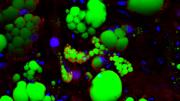Researchers at the Harvard Stem Cell Institute have identified two drugs that convert white fat—the kind that accumulates and stores energy—into brown fat, which burns energy through the release of heat. Such drugs have the potential to become a powerful tool in the fight against obesity. One of the drugs (tofacitinib) is already FDA-approved and on the market as a treatment for rheumatoid arthritis, although its effectiveness in promoting weight loss has not been tested in clinical trials—and it carries the unwelcome side effect of suppressing the immune system. The two drugs discovered so far were found during a screen of about a thousand chemical compounds; the researchers believe that if they could test the millions of compounds available to a pharmaceutical company, they could identify many more drug candidates.
Scientists have known for a long time that infants use brown-fat deposits to help regulate their body temperature. But adults were long thought not to have much brown fat, if any. That changed with the widespread use of PET scanning, a medical-imaging technique that reveals areas of high-glucose uptake, allowing researchers to deduce the presence of calorie-burning brown fat, which is dense with mitochondria, the energy-producing organelles within cells. With the realization that adults can and do retain some brown fat, came the understanding that if the amount of brown fat in the human body could be increased, this could help with weight control, as well as with a whole suite of metabolic diseases, because the body would be able to release excess calories as heat. Indeed, variations in brown-fat levels may partly explain why some people are less subject to weight gain than others.
In a phone interview, Chad Cowan, an associate professor of stem-cell and regenerative biology, explained that the compounds his lab group has discovered work by changing the behavior of newly created white-fat cells. “The effect happens when new cells come online—and it is a stable conversion,” he said. Thus, even though the cells are genetically still white-fat cells, their cellular machinery makes them resemble brown fat. “They have more mitochondria and they are more active,” Cowan reported. How long do these super cells survive? Typically, for white-fat cells, “turnover is months to a year,” he said, meaning that any future drug treatment for obesity that capitalized on such a conversion of white fat would be long-lasting, but not permanent.
Cowan has pioneered techniques for using stem cells, which in natural development can differentiate to become any cell in the body, to create human fat cells. His lab two years ago discovered how to create human fat in a dish—which enables the researchers to create an essentially limitless supply of human fat cells for use in drug-screening experiments. His lab had been working in partnership with Roche Pharmaceuticals, which suspended its research into human metabolic disease shortly before the discovery.









